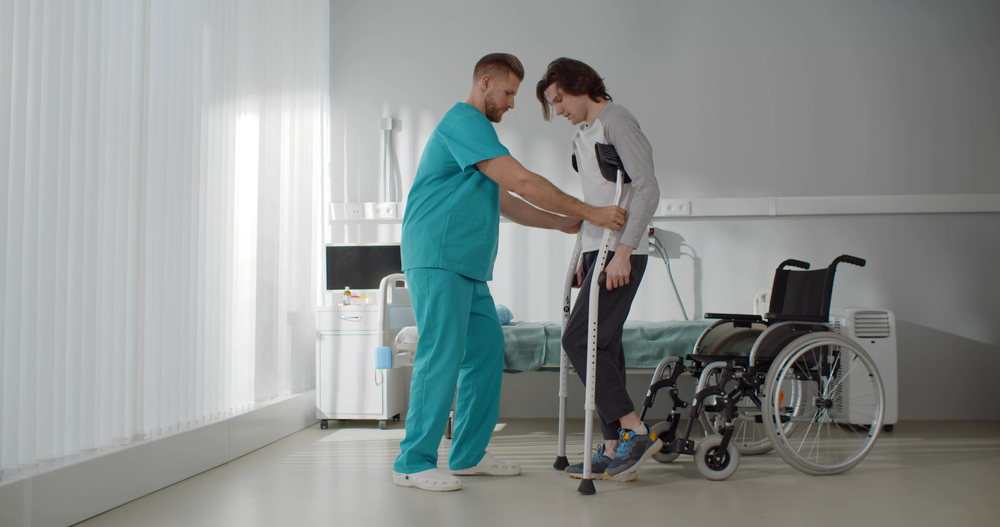
The Importance of Physiotherapy In Pre And Post-Surgical Rehabilitation
Physiotherapy can help reduce pain, swelling, and the risk of complications before or after surgery. It can also help improve your mobility, range of motion, and overall quality of life. In this blog, we’ll talk about the key role that physiotherapy plays both before and after surgery. By working closely with a physiotherapist to produce a personalised treatment plan, you can make sure you’re on the right track to a full recovery.
Pre-Surgical Physiotherapy: Why It Matters
Before undergoing surgery, it is important to prepare both physically and mentally for the procedure. Physiotherapy can play a crucial role in preparing the body for surgery and reducing the risk of complications. A pre-surgical physiotherapy program can help to improve the patient’s physical condition, reduce pain and swelling, and increase the range of motion.
Pre-surgical physical therapy has the following advantages:
- Improved Physical Condition: Strength, flexibility, and endurance can all be enhanced through pre-surgical physiotherapy for the patient. By doing so, you may be able to lower your risk of complications and enhance your surgery’s overall results.
- Reduced Pain And Swelling: Pre-operative physical therapy can aid in the reduction of pain and swelling in the affected area, making it simpler for the patient to control discomfort throughout the healing process.
- Increased Range Of Motion: Increased range of motion can lower the risk of stiffness and aid in a faster recovery thanks to pre-operative physiotherapy.
- Better Understanding Of The Procedure: Patients who are undergoing physical therapy may find it easier to comprehend the procedure they will be having and what to expect from the healing process. Overall well-being can be enhanced and anxiety can be reduced by doing this.
Individuals should consult with a licensed physical therapist to create a pre-operative physiotherapy plan tailored to their specific needs and desired outcomes before undergoing surgical procedures. This can increase the likelihood of a successful operation and a speedy recovery.
Post-Surgical Physiotherapy
When recovering from surgery, physical therapy is a crucial component of the recovery process. Physiotherapy following surgery is performed to help the patient get back to full strength and function as soon and as safely as possible. A physiotherapist may be involved in post-operative care immediately or at a later time, depending on the type of surgery.
Physiotherapy following surgery has many advantages.
- Reducing Pain And Swelling: After surgery, physiotherapy can help alleviate discomfort and swelling to facilitate a quicker recovery.
- Improving Mobility And Range Of Motion: After surgery, mobility and range of motion may decrease, but physiotherapy can help. This can lessen the likelihood of complications during surgery and boost the recovery rate.
- Reducing The Risk Of Re-Injury: Physical therapy can help reduce the likelihood of sustaining another injury after surgery by fostering greater muscular and postural control.
- Aids In The Return To Daily Activities: Patients can get back to their regular routine with the help of physiotherapy, which can speed up the recovery process.
Find a physiotherapist who has worked with patients in the postoperative period. Together, you and your physical therapist will create a treatment strategy that is specific to your condition and your goals for recovery. Various methods, such as manual therapy, exercise, and others, may be used.
The road to recovery from surgery is different for everyone, and the time it takes to get back on your feet depends on factors like the nature of the procedure and how healthy you currently are. However, physiotherapy can play a significant role in helping patients achieve a successful outcome following surgery with the right support and guidance.

Types Of Physiotherapy Techniques And Treatments
There is a wide range of options for pre-and post-operative physiotherapy treatments that can help patients recover completely and quickly. Reduce pain and swelling, increase mobility and range of motion, and lessen the likelihood of complications with the help of these approaches. The examples that follow are of common physiotherapeutic procedures:
1). Manual Therapy
When a physiotherapist uses their hands to work on a patient, they are engaging in manual therapy, also recognised as “hands-on” physiotherapy. This method has been shown to decrease pain and swelling, enhance mobility, and broaden range of motion. Massage, joint mobilisation, and soft tissue release are all examples of manual therapy techniques frequently used in pre-and post-operative rehabilitation.
2). Exercise
Physical therapy, which is often used before and after surgery, is particularly effective when it includes exercise. Patients will work with their physical therapists to create a unique exercise plan that addresses their individual concerns and promotes their desired outcomes. Exercises such as stretching, strengthening, and low-impact aerobics could all be part of this plan. Exercising regularly can help with a wide variety of health issues, including enhancing strength, flexibility, and range of motion, decreasing pain, and enhancing quality of life.
3). Electrotherapy
In order to alleviate pain and enhance musculoskeletal function, electrotherapy employs the use of electrical stimulation. This method can be used before and after surgery to lessen the patient’s recovery time, speed up the healing process, and enhance circulation. TENS (transcutaneous electrical nerve stimulation) and EMS (electrical muscle stimulation) are two types of electrotherapy commonly used in pre-and post-operative rehabilitation (EMS).
4). Acupuncture
Traditional Chinese medicine employs acupuncture, in which thin needles are inserted into the body at strategic points for therapeutic effect. Pain and swelling can be reduced, blood flow can be increased, and healing can be accelerated when this method is used in pre-and post-operative rehabilitation.
5). Dry Needling
Dry needling is a technique similar to acupuncture that involves the insertion of fine needles into trigger points in the muscles to relieve pain. This technique can be used in pre- and post-surgical rehabilitation to help reduce pain, improve mobility, and increase flexibility.
Each of these techniques and treatments can be effective in pre- and post-surgical rehabilitation, and the right approach will depend on the individual needs and goals of each patient. Your physiotherapist will work with you to determine the best approach for your specific needs and goals.
Working With A Physiotherapist
When it comes to pre- and post-surgical rehabilitation, it is crucial to work with a qualified and experienced physiotherapist. A physiotherapist can assess your specific needs and develop a personalised treatment plan that will help you achieve the best possible outcomes. They can also monitor your progress and make any necessary adjustments to your treatment plan along the way.
In order to get the most out of your physiotherapy experience, it is important to communicate openly and honestly with your physiotherapist. This includes discussing any goals or concerns you may have, as well as providing regular feedback on how you are feeling and what is working (or not working) for you.
It is also important to remember that physiotherapy is a collaborative process between you and your physiotherapist. While your physiotherapist will provide guidance and support, it is ultimately up to you to follow through with your treatment plan and make the necessary changes to your lifestyle and habits that will support your rehabilitation goals.
Final Thoughts
Physiotherapy plays a vital role in both pre and post-surgical rehabilitation. It helps to reduce pain and swelling, improve mobility and range of motion, and reduce the risk of complications. Physiotherapy techniques and treatments can vary depending on the type of surgery and individual needs, but common treatments include manual therapy, exercise, electrotherapy, and acupuncture.
Working with a physiotherapist to develop a personalised treatment plan is key to achieving the best outcomes and making a successful return to regular activities. If you’re considering surgery, or have recently undergone a procedure, make sure to consider the benefits of physiotherapy and work with a qualified professional to support your recovery.
Reach Out To Upwell Health Collective Today
Consult with a physiotherapist at Upwell Health Collective before surgery and as part of your recovery process. As you embark on your road to recovery, you can rely on our team of highly trained and skilled physiotherapists to provide you with the highest standard of care, support, and guidance possible. You should get started on the path to recovery right away. Invest in your future health and wellness by scheduling an appointment with Upwell Health Collective right away.
Please get in touch with us at Upwell Health on (03) 8849 9096 or book an appointment today.
